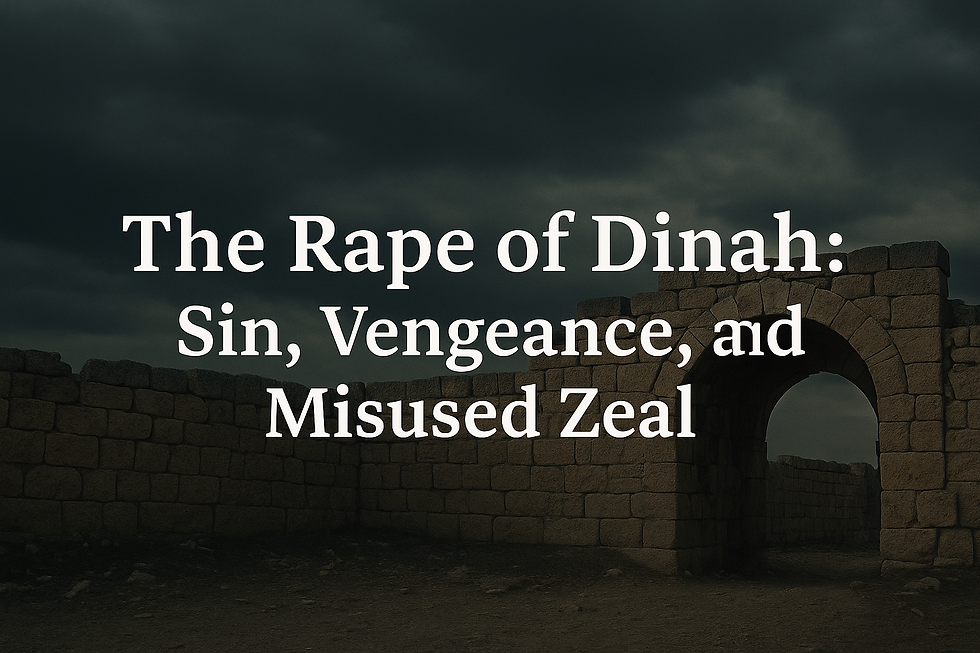The Rape of Dinah: Sin, Vengeance, and Misused Zeal
- Bible Believing Christian

- Sep 5, 2025
- 3 min read

The Rape of Dinah: Sin, Vengeance, and Misused Zeal
Genesis 34 tells one of the most disturbing stories in the patriarchal narratives. Dinah, the daughter of Jacob and Leah, is assaulted by Shechem, son of Hamor the Hivite. What follows is not justice but a cycle of deceit, vengeance, and shame that stains Jacob’s household. This chapter is deliberately uncomfortable—yet it teaches us about the dangers of unchecked zeal, the misuse of sacred things, and the difference between human wrath and divine justice.
Dinah and Shechem
Genesis 34:1–2 (NASB) sets the scene: “Now Dinah the daughter of Leah, whom she had borne to Jacob, went out to visit the daughters of the land. When Shechem the son of Hamor the Hivite, the prince of the land, saw her, he took her and lay with her by force.”
The Hebrew phrase ‘ānâh (“to humble/violate”) is used—this was not a consensual union. Shechem’s act was violent and dishonorable. Yet in a twisted irony, he later speaks of “love” for Dinah (Genesis 34:3). Desire, even when cloaked in affection, cannot excuse sin.
The Deception of Simeon and Levi
Shechem’s father, Hamor, seeks to arrange a marriage, offering generous terms: “Please give her to him in marriage. Intermarry with us; give your daughters to us, and take our daughters for yourselves.” (Genesis 34:8–9, NASB). For Jacob’s sons, however, the offense is too great. Simeon and Levi—Dinah’s full brothers—devise a deceit. They agree to the marriage on one condition: every male in the city must be circumcised.
Circumcision, the holy sign of the covenant, is twisted into a weapon. Once the men are weakened, Simeon and Levi slaughter them all (Genesis 34:25–26). Their zeal burns hot, but their actions dishonor the very covenant they sought to defend.
Jacob’s Response
When Jacob hears of the massacre, his words are telling: “You have brought trouble on me by making me repulsive among the inhabitants of the land… and I am few in number, they will band together against me and attack me, and I will be destroyed, I and my household.” (Genesis 34:30, NASB). Jacob is concerned for the survival of his family. His sons, however, justify themselves: “Should he treat our sister like a prostitute?” (Genesis 34:31, NASB).
The text ends unresolved. Jacob condemns their violence; the brothers cling to their sense of justice. What remains is tension—a family fractured by sin on both sides: Shechem’s assault and Simeon and Levi’s bloodshed.
Misconceptions: Was This Justice?
Some readers over the centuries have tried to defend Simeon and Levi, suggesting their zeal was righteous. But Scripture itself offers correction. In Genesis 49, Jacob recalls this act on his deathbed: “Simeon and Levi are brothers; their swords are implements of violence… Cursed be their anger, for it is fierce; and their wrath, for it is cruel.” (Genesis 49:5–7, NASB). Their zeal was not justice but cruelty.
Another misconception is that this story somehow legitimizes using God’s covenant signs for manipulation or warfare. In truth, it shows the opposite—the desecration of circumcision as a deceitful ploy is condemned by the narrative itself.
Theological Reflection
This account shows the consequences of sin multiplying when human anger tries to fix human evil. Dinah was wronged grievously; but her brothers’ vengeance brought dishonor rather than healing. By twisting circumcision into a weapon, they trampled what God had given as a sign of blessing.
The New Testament offers a sharp contrast: “For the anger of man does not achieve the righteousness of God.” (James 1:20, NASB). True justice belongs to God, not to human wrath disguised as zeal.
Christ-Centered Conclusion
The Dinah account leaves us longing for a better justice. Simeon and Levi’s zeal failed because it was cruel; Jacob’s caution failed because it was self-preserving. What we need is a justice that is both righteous and merciful. That justice is found in Christ, who bore the violence of human sin on the cross and overcame it with forgiveness.
Where Dinah’s story exposes the tragedy of vengeance, the gospel offers the hope of redemption. Christ’s zeal is pure—it cleanses the temple without cruelty, rebukes hypocrisy without corruption, and brings healing where others bring bloodshed. In Him, we find the justice Simeon and Levi could not deliver, and the hope Jacob could not secure.
